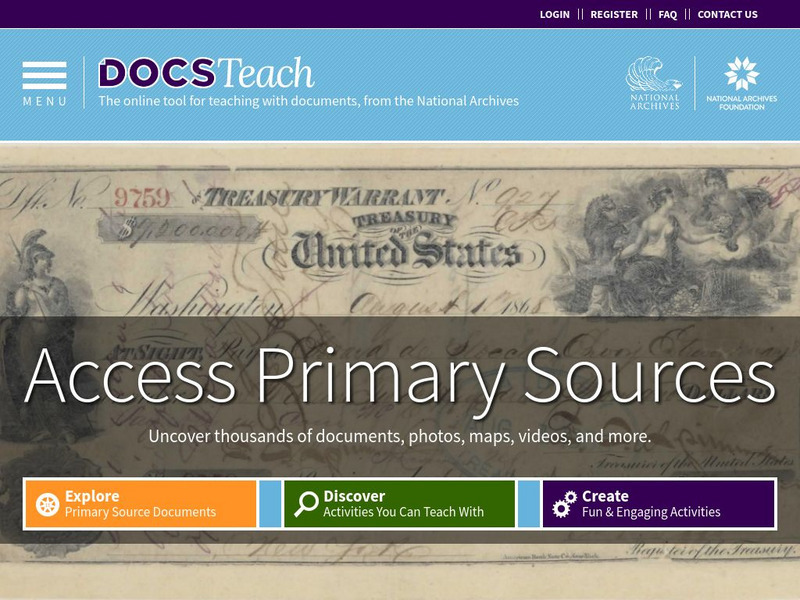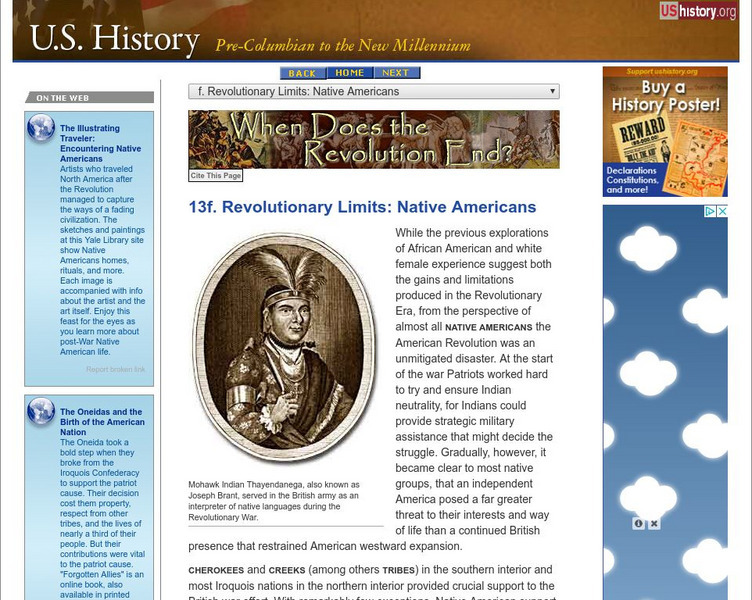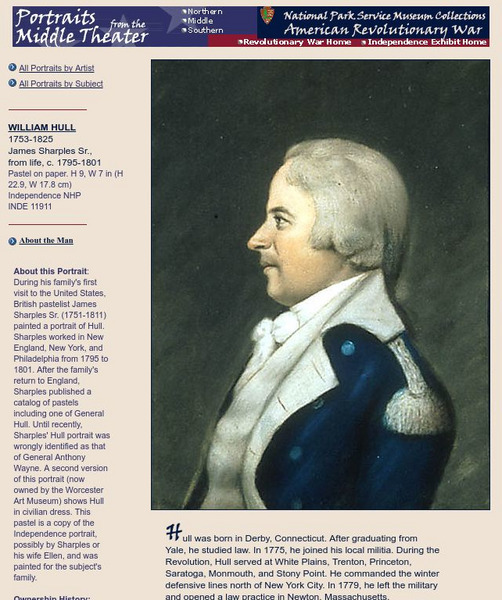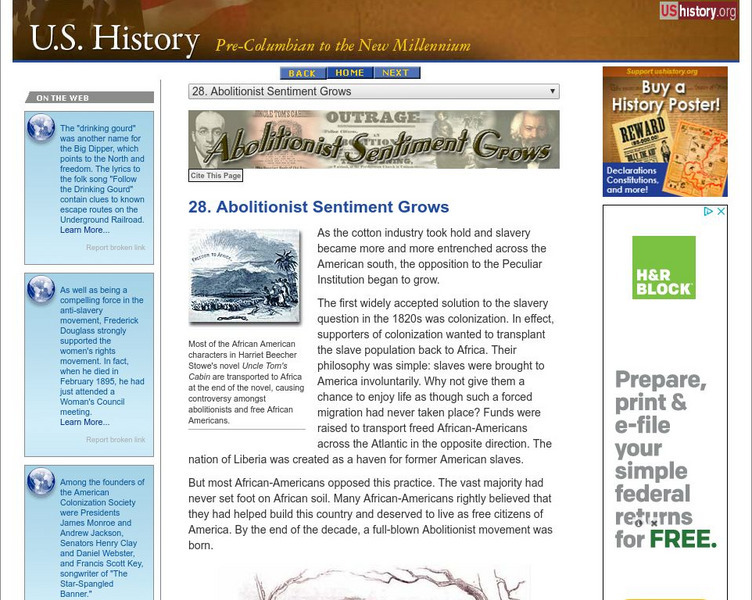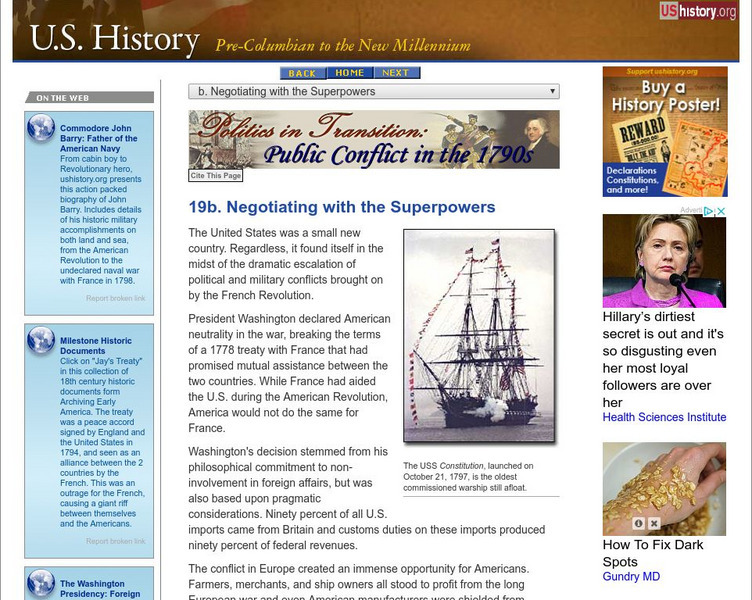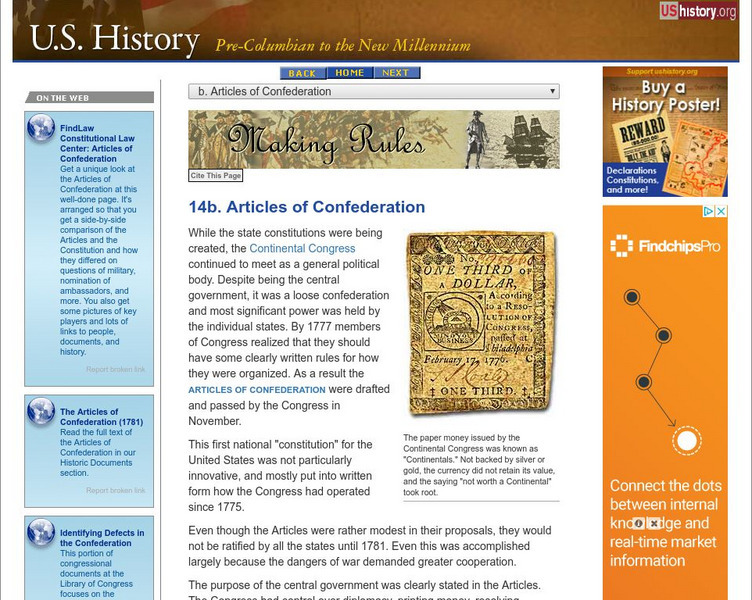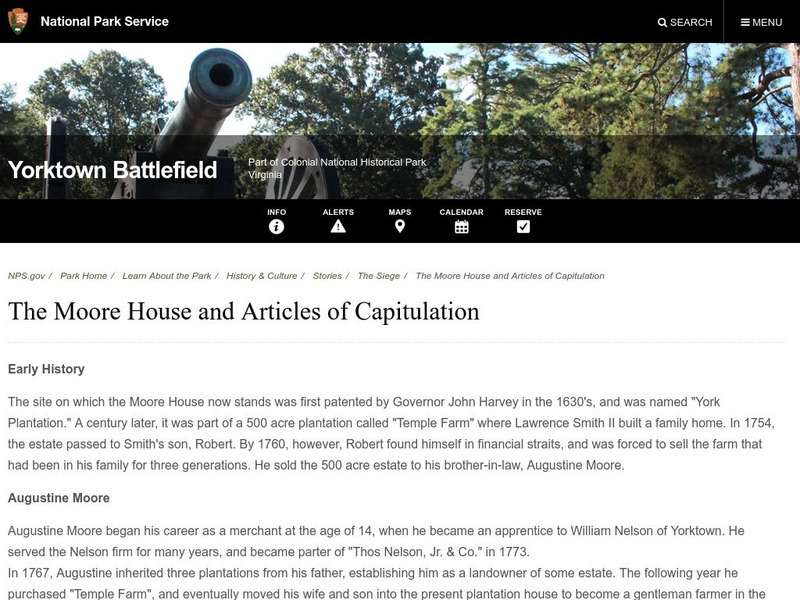PBS
Wnet: Thirteen: Freedom: A History of Us: Revolution Webisode 2
Webisode 2 - Revolution. The history of the United States is presented in a series of webisodes, within each are a number of segments. Included are links to lesson plans, teacher guides, resources, activities, and tools.
US National Archives
National Archives: Bring History to Life
How can you actually bring history to life? Here are some tools from the National Archives that allow students to create their own projects using primary-source based activities that develop historical thinking skills. Special historical...
Independence Hall Association
U.s. History: Revolutionary Limits: Native Americans
A good description of the actions and fate of the Native Americans who allied with the British to fight against the Americans. Find out that while the Native Americans had treaties with the British, they were not represented at the talks...
Independence Hall Association
U.s. History: Loyalists, Fence Sitters, and Patriots
Read about the war of propaganda the Patriots needed to wage in order to persuade the vast majority of Americans, who were at first ambivalent to the cause of independence, to support the ideals of the Revolutionary War.
Curated OER
National Park Service: Revolutionary War: Portraits: James Hull
The National Park Service has posted portraits of people that lived in the the early history of the English colonies, including General William Hull. Here you will find a description of the history of his portrait as well as a brief...
University of Groningen
American History: Outlines: Drafting the Constitution
Essay covers from the Articles of Confederation and the problems of disunity of the new states after the Revolutionary War, internally as well as externally, to the Constitutional Convention, an attempt to address the Articles' problems....
Independence Hall Association
U.s. History: Revolutionary Changes and Limitations: Women
Often the ideal and reality do not conincide for quite some time. That's true of the ideal of true equality between the sexes after the War for Independence. See why the end of the war did not bring indepence for married women, and why...
Smithsonian Institution
National Museum of American History: Within These Walls
Two hundred years' worth of American history all in one house. Learn what a close examination of a single-family dwelling can tell us about what life was like during five different periods of American history: the colonial era, the...
Independence Hall Association
U.s. History: Abolitionist Sentiment Grows
Abolitionists had been active since the end of the Revolutionary War, but in the 1830s they became more radical in their demands to end slavery. See what their solutions were, and read about how abolitionist views were thwarted in the...
Independence Hall Association
U.s. History: Negotiating With the Superpowers
Read about the problems President George Washington had with foreign affairs. Both France and Great Britain ignored American sovereignty and claims of neutrality. Read about Great Britain's disregard of the Treaty of Paris which ended...
Independence Hall Association
U.s. History: Articles of Confederation
During the Revolutionary War, it was necessary to put together some sort of central government, primarily to raise and pay an army. Read about the rules finally passed by Congress in 1777, called the Articles of Confederation. See what...
Independence Hall Association
U.s. History: Committees of Correspondence
See how organization can be a stepping stone to freedom. Read about the actions and the reasons behind those actions of the Committees of Correspondence prior to the Revolutionary War.
Independence Hall Association
U.s. History: Bunker Hill
Read about the Battle of Bunker Hill, which really took place at Breed's Hill, and find out why it was such a stunning victory for the Americans even though they lost the battle.
Curated OER
National Park Service: The Moore House and Articles of Capitulation
The National Park Service provides a brief history of the Moore House where the surrender of Cornwallis took place. The Articles of Capitulation are explained as well.
Curated OER
National Park Service: Colonial National Historical Park: Siege of Yorktown
This site provides a history of the Siege of Yorktown in 1781.
Independence Hall Association
U.s. History: The Battle of Saratoga
The weeks leading up to the Battle of Saratoga were filled with disaster for the British troops. Read about the problems General Burgoyne had, and find out how the Americans took advantage of those problems to deliver a stunning defeat...
Independence Hall Association
U.s. History: The French Alliance
The surrender of General Burgoynne at Saratoga gave the French the assurance that the Continental Army had a fighting chance to beat the British. Read about early French help and the formal agreements signed between France and America.
Raleigh Charter High School
Mrs. Newmark's Page: Matching Quiz on Events Leading to the American Revolution
Matching exercise is self-scored and checks your understanding of important events of the Revolutionary War.
Raleigh Charter High School
Mrs. Newmark's Page: Quiz on the Road to Revolution
Seventeen question multiple-choice exercise checks your understanding of the Revolutionary War.
Raleigh Charter High School
Mrs. Newmark's Page: Quiz on Important People on the Road to Revolution
Matching exercise is self-scored and checks your understanding of important people of the Revolutionary War.
Ducksters
Ducksters: Delaware State History for Kids
A site exploring the history and timeline of the state of Delaware including early explorers, Native Americans, colonial settlers, and the Revolutionary War.
The History Place
The History Place: The Vietnam War America Commits
This site from The History Place provides a lengthy timeline, accented with many quotations, explaining how America came to be directly involved in Vietnam. This is a great site to check out on the subject.
OpenStax
Open Stax: Identity During the American Revolution
From a chapter on "America's War for Independence," this section of the chapter explains Loyalist and Patriot sentiments and identifies different groups that participated in the Revolutionary War.
Read Works
Read Works: u.s. Presidents James Monroe
[Free Registration/Login Required] An informational text about James Monroe, the fifth President of the United States. A question sheet is available to help students build skills in reading comprehension.



